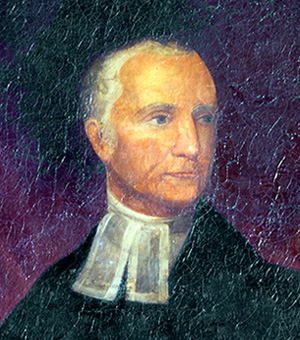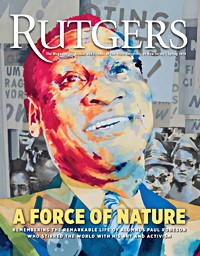Philip Milledoler
Rutgers President, 1825 to 1840

The revival of Rutgers College was the result of several factors, two of which stand out: successful fundraising, and collaboration between the trustees and the synod. The sale of the building had cleared the college of its debt and the synod immediately expended funds to complete most of the interior rooms of the building and perform much needed alterations to the exterior and the college grounds. Prompted by the success of a second lottery that yielded $20,000 in 1825, the trustees reached agreement with the synod on a plan to commence instruction. Under this new covenant, Rutgers College opened its doors to 30 students on November 14, 1825. To lead the college in this new beginning, the trustees turned to the Reverend Philip Milledoler, professor of didactic theology, a member of the Queen’s College trustees since 1815, and close friend of Colonel Henry Rutgers, who also served for a short time as a trustee of the college.
Rutgers College blossomed under the leadership of Philip Milledoler. The curriculum offered during his presidency followed a prescribed course of mathematics and Greek and Latin languages and literature in the first two years, and a broadened and flexible curriculum that included philosophy, literature, and political economy during the third and fourth years.
A clergyman of much distinction, Philip Milledoler was born in Rhinebeck, New York, and a graduate of Columbia College. In 1794 he was ordained to the ministry by the German Reformed Synod at Reading, Pennsylvania. Milledoler held various offices under the General Assembly of the Presbyterian Church and was moderator of the assembly in 1808. He was active in forming the American Bible Society and the United Foreign Missionary Society. In 1811 he was appointed by the Presbytery of New York to instruct students in theology and continued this function until the founding of the Princeton Theological Seminary. In 1813 he became the pastor of the Reformed Dutch Church in New York, serving with distinction for 12 years until he was called to New Brunswick in 1825.
Rutgers College blossomed under the leadership of Milledoler and much of its early success was due to its small but able faculty. The curriculum offered during his presidency followed a prescribed course of mathematics and Greek and Latin languages and literature in the first two years, and a broadened and flexible curriculum that included philosophy, literature, and political economy during the third and fourth years. In 1830 students in the upper classes received for the first time lectures in geology, mineralogy, and chemistry. The senior class course in moral philosophy integrated the entire curriculum by “relating all subjects to higher general laws of nature.”
Enrollment in the college slowly increased over the next several years. Students came predominantly from Dutch families who resided in New York and New Jersey. Once in New Brunswick they secured rooms in respectable boarding houses and formed an integral part of the community. Students formed their own associations that focused their educational and social experiences. The predominant association established during Milledoler’s presidency and continued through the 1920s was the literary society. In 1825 Rutgers students established two literary societies, Peithessophian and Philoclean, that became the center of social and intellectual life in the college during the 19th century.
The second revival of Rutgers College under the Reverend Milledoler commenced with enthusiastic optimism and appeared to show great promise for the future. Finances remained a recurring problem, but the trustees were willing to solicit additional subscriptions among the church congregations to meet salary obligations and operating expenses. The trustees and general synod enjoyed a relatively peaceful coexistence through 1832 but were soon entangled in controversy. At the center of the dispute was the relationship of the college and the theological seminary. The ensuing battle resulted in a move toward establishing the independence of the college from the church.
Milledoler found himself the source of dissension. He resigned the presidency of Rutgers College on July 2, 1839, but agreed to continue in that capacity until a suitable replacement could be secured. He remained in office for another year and continued teaching in the theological seminary until 1841, when he returned to New York City to devote the remaining years of his life to his family, his church, and his city. He died on September 22, 1852, his 77th birthday.

